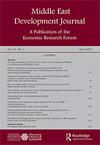The economic response of rural areas to local supply shock: evidence from the Occupied West Bank*
IF 0.9
Q4 DEVELOPMENT STUDIES
引用次数: 4
Abstract
ABSTRACT As the Second Intifada broke out at the end of 2000, Israel severely restricted entry for Palestinians to its labor market, forcing a great section of commuters to return to their local labor markets. This paper examines the economic effect of the return commuting on non-commuters in rural areas of the Occupied West Bank. Utilizing place-of-work, repeated cross-section data, the results show that returned commuting has negative repercussions. Specifically, wages decrease for workers with the same skill type (low skilled). The results also provide evidence that favors the crowd-out effect hypothesis. The estimated probability of unemployment increases for non-commuters with disproportionate effect for job seekers relative to those reportedly employed. Consistent with this result, increases in return commuting prolong unemployment duration for the low skilled. The outcome of this paper helps understand how rural labor markets may respond to labor supply shocks.农村地区对当地供应冲击的经济反应:来自被占领西岸的证据*
摘要随着2000年底第二次起义的爆发,以色列严格限制巴勒斯坦人进入其劳动力市场,迫使大量通勤者返回当地劳动力市场。本文研究了被占领西岸农村地区通勤对非通勤者的经济影响。利用工作地点、重复的横断面数据,结果表明,返程通勤具有负面影响。具体而言,具有相同技能类型(低技能)的工人的工资下降。研究结果也提供了支持排挤效应假说的证据。据估计,非通勤者的失业率增加,对求职者的影响与据报道的就业者不成比例。与这一结果一致的是,往返通勤的增加延长了低技能人群的失业时间。本文的结果有助于理解农村劳动力市场如何应对劳动力供应冲击。
本文章由计算机程序翻译,如有差异,请以英文原文为准。
求助全文
约1分钟内获得全文
求助全文

 求助内容:
求助内容: 应助结果提醒方式:
应助结果提醒方式:


